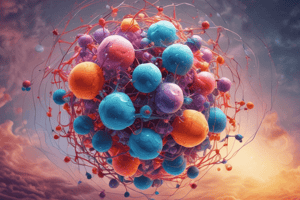Podcast
Questions and Answers
Which physical state of matter has particles that are tightly packed in a highly ordered system?
Which physical state of matter has particles that are tightly packed in a highly ordered system?
- Plasma
- Gas
- Solid (correct)
- Liquid
What characteristic distinguishes gases from solids and liquids?
What characteristic distinguishes gases from solids and liquids?
- Gases are highly compressible. (correct)
- Gases have a definite volume.
- Gases have high density.
- Gases have a definite shape.
Which statement is true regarding the motion of particles in liquids?
Which statement is true regarding the motion of particles in liquids?
- They are moderately ordered with some interaction. (correct)
- They are tightly packed and do not flow.
- They are completely disordered.
- They are relatively far apart and independent.
How do solids generally respond to an increase in temperature?
How do solids generally respond to an increase in temperature?
Which of the following statements about liquids is incorrect?
Which of the following statements about liquids is incorrect?
Flashcards are hidden until you start studying
Study Notes
Matter
- Matter is anything that has mass and occupies space.
Physical States of Matter
Solids
- Solids have a definite shape and volume.
- Solids do not flow.
- Particles in solids are closely packed and highly ordered.
- Particles in solids have restricted motion.
- Solids are generally incompressible.
- Most solids expand slightly when heated.
- Solids can exhibit high or low density.
Liquids
- Liquids have no definite shape, but they do have a definite volume.
- Liquids flow.
- Particles in liquids are relatively close to one another and moderately ordered.
- Liquids are incompressible.
- Liquids expand slightly when heated.
- Liquids can exhibit high or low density.
Gases
- Gases have no definite shape or volume.
- Gases flow.
- Particles in gases are independent and relatively far apart.
- Gases have low density.
- Gases are highly compressible.
- Gases expand greatly when heated.
Studying That Suits You
Use AI to generate personalized quizzes and flashcards to suit your learning preferences.




